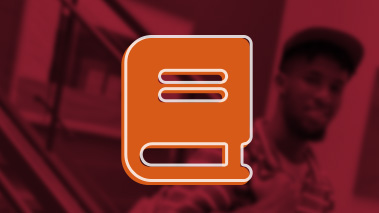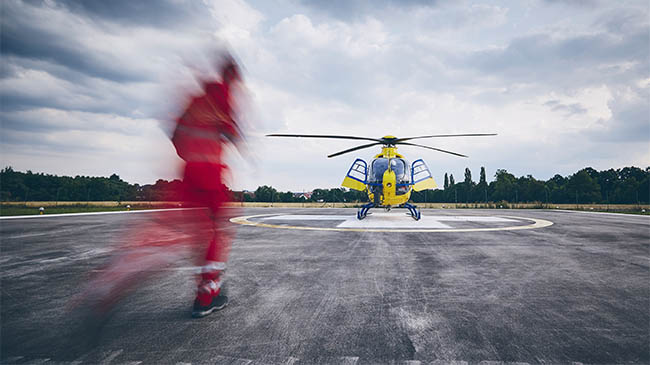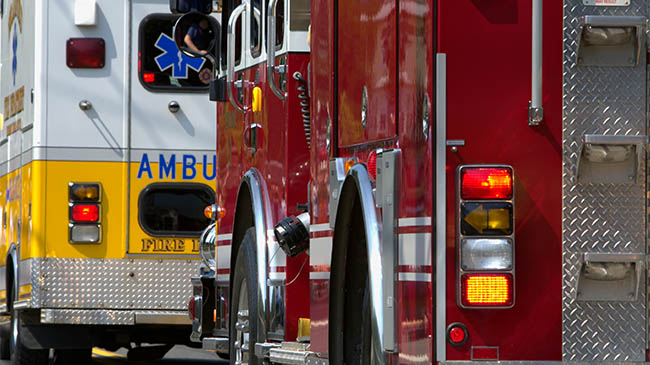Emergency Medical Services, Emergency Medical Technician (EMT)
- Career Studies Certificate (C.S.C.)
Program Snapshot
Your Learning Options
In-Person, Hybrid, Online
9 Credit Hours
Estimated Time to Complete
1 year (1 full-time semesters)
In-State Tuition Per Credit Hour
$176.00 | Calculate your costs
Why be an EMT?
Embark on an exciting, fulfilling career that makes a tangible impact on people's lives.
- Learn in a state-of-the-art immersive simulation lab and ambulance simulator that provide a realistic environment for you to practice and enhance your skills.
- Train in a Virginia Office of EMS approved program ensuring that your education meets and exceeds industry standards.
- Benefit from strong connections with local industry partners, networking opportunities and potential employment connections.
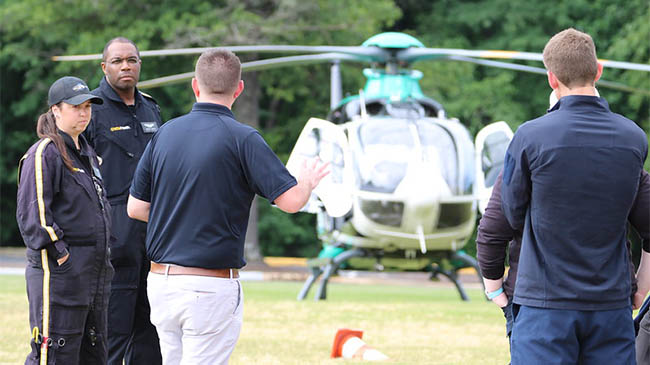
Program Roadmap
Get all the details on our Emergency Medical Technician program, including class sequences, admission requirements, financial considerations, and more.
Paying for College
We are committed to using all of the available funds to help you gain access to a college education. In fact, more than 91% of our students graduate without any educational debt. In 2023, Reynolds Community College students received over $21 million dollars in grants, loans, work-study and scholarships with the average aid awarded totaling over $4,000 per student.
Payment plans are offered to break down tuition payments. Textbook Assistance and Laptop Lending Programs are also available. Be sure to explore all the types of financial aid available as well!

Why Reynolds?
We are more than a community college.
Reynolds is the key that unlocks the door to your academic and professional success. Here you will find a safe place to start. We will help you explore, dream, succeed, try, and try again. Our amazing faculty and highly personalized advisors, your Reynolds Navigators, are well known for guiding you to discover that "aha moment.” That means an outstanding college experience, less debt, more freedom, and a solid start on your future.
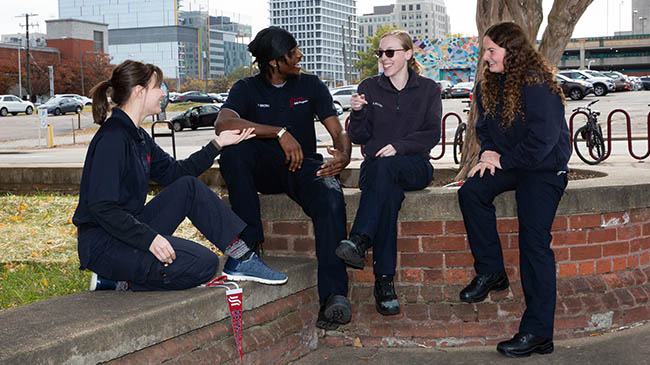
Tailor the program to fit your needs with various scheduling options available. This one-semester program is designed to get you into the field quickly, making it an ideal choice for those seeking a rapid entry into the workforce.
Benefit from the latest advancements in emergency medical training and equipment. Our program ensures that you are trained with the most up-to-date techniques and tools, setting you apart as a skilled and knowledgeable EMT.
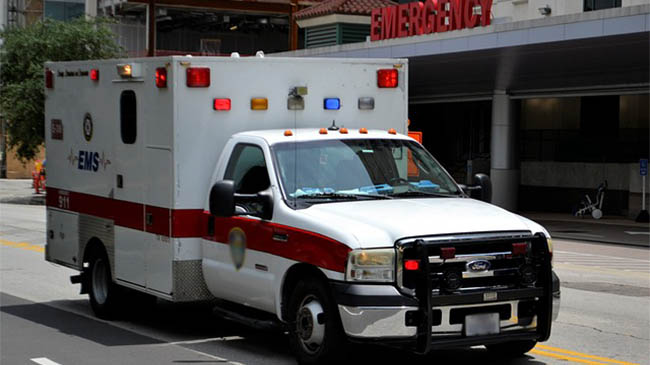
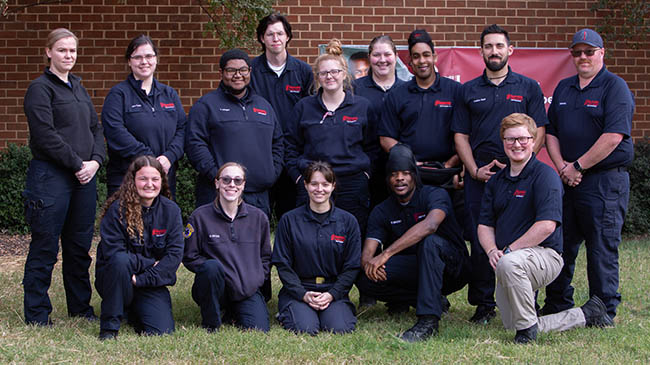
As an EMT, be at the forefront of emergency healthcare, responding to 911 calls and efficiently addressing life-threatening issues such as difficulty breathing or major bleeding. You play a crucial role as a first responder, acting as a vital link between the community and major hospital centers.
Class Highlights
EMS 100 - CPR for Healthcare Providers
Train in Cardiopulmonary Resuscitation that meets current Emergency Cardiac Care (ECC) guidelines for Cardiopulmonary Resuscitation education for Healthcare Providers.
EMS 111 - Emergency Medical Technician
Prepare for certification as a Virginia and National Registry EMT, focusing on all aspects of pre-hospital basic life support.
EMS 120 - Emergency Medical Technician Clinical
Learn under the guidance of experienced professionals, receiving hands-on training, directly interacting with sick or injured patients.
Additional Program Information
PURPOSE: The Emergency Medical Technician program prepares students to become Emergency Medical Technicians at the entry level. This is a one-semester program that offers several scheduling options for students.
OCCUPATIONAL OBJECTIVES: Certified Emergency Medical Technician.
STUDENT LEARNING OUTCOMES:
- Cognitive knowledge level expected of an entry level EMT and as necessary to function in a healthcare setting.
- An ability to understand, interpret and apply EMS and general medical knowledge necessary to function in a healthcare setting.
- The ability to present oneself in an ethical and professional manner.
- Possess the ability to document patient findings, treatments, and other pertinent information in electronic prehospital patient care report or like software. Ability to communicate both verbally and in writing to peers and/or other healthcare providers.
- Perform a comprehensive history and physical examination to identify factors affecting the health and health needs of a patient.
- The ability to perform a broad range of clinical skills, procedures and equipment.
ADMISSION REQUIREMENTS: General college curricular admission.
PROGRAM SPECIFIC REQUIREMENTS: In addition to the general college curricular admission requirements, students must have a current CPR card from either the American Heart Association-BLS Provider or the American Red Cross-Professional Rescuer prior to the start of the first day of class. Students without a current CPR card must complete EMS 100 - CPR for Healthcare Providers or HLT 105 - Cardiopulmonary Resuscitation before classes start. EMS 100 will be offered prior to the first day of class for EMS 111. Students desiring to further their emergency medical training and capabilities should consider the Emergency Medical Services -Paramedic Associate of Applied Science degree after completing this career studies certificate.
All potential EMS students are encouraged to meet with one of the EMS Program Advisors before each semester starts.
FUNCTIONAL SKILL REQUIREMENTS: The functional skills listed below apply to students entering the EMS - Emergency Medical Technician CSC and EMS - Paramedic AAS degree. Students entering these programs must have the ability to, but not limited to:
- Verbally communicate in person, via telephone and telecommunications using the English language;
- Hear spoken information from co-workers, patients, physicians, and dispatchers and sounds common to the emergency scene;
- Lift, carry, and balance a minimum of 125 pounds equally distributed (250 pounds with assistance), a height of 33 inches, and a distance of 10 feet;
- Read and comprehend written materials under stressful conditions;
- Use a prescribed format to document patient information in writing or by entry into a computer program;
- Demonstrate manual dexterity and fine motor skills, with ability to perform all tasks related to quality patient care in a safe manner;
- Bend, stoop, crawl, and walk on even surfaces; and
- Meet minimum vision requirements to operate a motor vehicle within the state.
Please visit Virginia Dept. of Health - How to become an EMS provider in Virginia. for a complete list of Basic Life Support (BLS) and Advanced Life Support (ALS) Functional Job Descriptions.
FINANCIAL REQUIREMENTS: In addition to the regular college tuition and fees, the following expenses may be required.
To determine current tuition and fees, view our Tuition and Fees page or call the School of Health Professions office at (804) 523-5375. The instructor will inform students of the textbooks and other required learning materials needed in the syllabus for each course. This information can also be found on the college bookstore website. Additional scholarships/grants may be available, please contact program advisors for additional information.
| CPR Textbook/Mask Fee | $50.00 |
| Textbook | $100.00 |
| Castlebranch Registration (Immunization Records, Background Check and Drug Testing) | $106.00 |
| FISDAP/Platinum Planner Scheduler/EMS Testing | $120.00 |
| Uniforms (boots, belt, pants, Reynolds EMS program shirt) | $75.00 - $150.00 |
| Testing Fees: | |
| National Registry Paramedic Cognitive Examination (initial) | (waived) $80.00 |
| Medical Check Up | varies according to student’s doctor’s fees |
| Total Estimated Program Fees | $450.00 |
CONTINUATION IN THE PROGRAM: Students must successfully achieve a course grade of at least “B” (80) in each EMS course. Students MUST pass both EMS 111 & EMS 120 in order to meet the National Registry of Emergency Medical Technicians (NREMT) testing eligibility. State EMT Certification is a pre-requisite for continuation into the Paramedic program.
CLINICAL/EMS CONTRACTS: Individual contracts are in effect with each affiliate clinical/EMS agency, and these contracts differ in requirements for students. In general, contracts include the following:
- Clinical/EMS agencies reserve the right to dismiss a student from their agency at any time. Students must wear the proper uniform, conforming to program and health care agency standards.
- Students must follow published hospital and EMS policies.
- Students must meet health, immunity, and immunization requirements specified by the affiliated clinical/EMS facility and/or agency. Failure to comply with these requirements will prevent the student from meeting specific course learning outcomes required for program progression and completion.
- Students release the facility, its agents, and its employees from any liability for any injury or death to self or damage to personal property arising out of the clinical agreement or use of the facility. (Assessment of Risk document is signed and on file, once the student is accepted into the program.)
- Students are financially responsible for any medical care required while in the clinical setting.
- Students must have a current American Heart Association CPR BLS for Health Care Provider Certification or American Red Cross “BLS or Professional Rescuer.”
- Demonstration of professional behavior is expected at all clinical/EMS learning experiences. Clinical/EMS preceptors will direct a student to leave the learning environment if unacceptable behaviors are observed.
- The health care agency may deny a student participation based on results of background and drug screen.
- Students must submit required clinical documents before beginning clinical/EMS rotation. A student who does not meet published deadlines for submission forfeits his/her enrollment and will not meet program requirements for certification testing eligibility.
